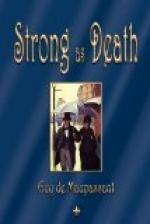He asked himself as he questioned his memory whether the Countess in her brightest bloom had had that fawn-like, supple grace, that bold, capricious, irresistible charm, like the grace of a running, leaping animal. No. She had had a riper bloom but was less untamed. First, a child of the city, then a woman, never having imbibed the air of the fields and lived in the grass, she had grown pretty under the shade of the walls and not in the sunlight of heaven.
When they reentered the castle the Countess began to write letters at her little low table in the bay-window; Annette went up to her own room, and the painter went out again to walk slowly, cigar in mouth, hands clasped behind him, through the winding paths of the park. But he did not go away so far that he lost sight of the white facade or the pointed roof of the castle. As soon as it disappeared behind groups of trees or clusters of shrubbery, a shadow seemed to fall over his heart, as when a cloud hides the sun; and when it reappeared through the apertures in the foliage he paused a few seconds to contemplate the two rows of tall windows. Then he resumed his walk. He felt agitated, but content. Content with what? With everything.
The air seemed pure to him, life was good that day. His body felt once more the liveliness of a small boy, a desire to run, to catch the yellow butterflies fluttering over the lawn, as if they were suspended at the end of elastic threads. He sang little airs from the opera. Several times he repeated the celebrated phrase by Gounod: “Laisse-moi contempler ton visage,” discovering in it a profoundly tender expression which never before he had felt in the same way.
Suddenly he asked himself how it was that he had so soon become different from his usual self. Yesterday, in Paris, dissatisfied with everything, disgusted, irritated; to-day calm, satisfied with everything—one would say that some benevolent god had changed his soul. “That same kind god,” he thought, “might well have changed my body at the same time, and rejuvenated me a little.” Suddenly he saw Julio hunting among the bushes. He called him, and when the dog ran up to put his finely formed head, with its curly ears, under his hand, he sat down on the grass to pet him more comfortably, spoke gentle words to him, laid him on his knees, and growing tender as he caressed the animal, he kissed it, after the fashion of women whose hearts are easily moved to demonstration.
After dinner, instead of going out as on the evening before, they spent the hours in the drawing-room.




